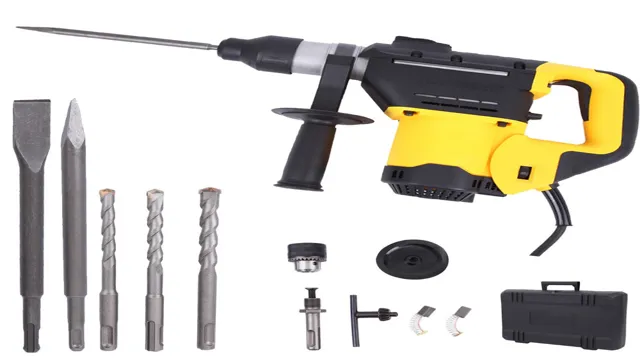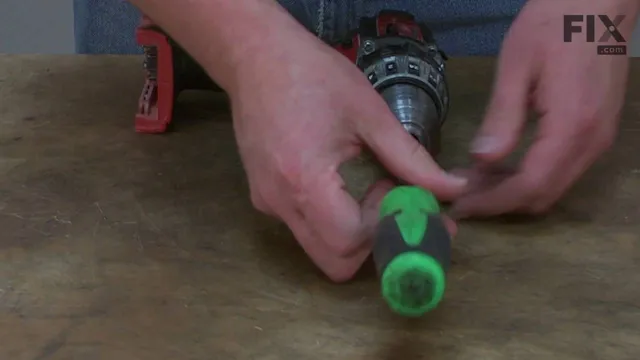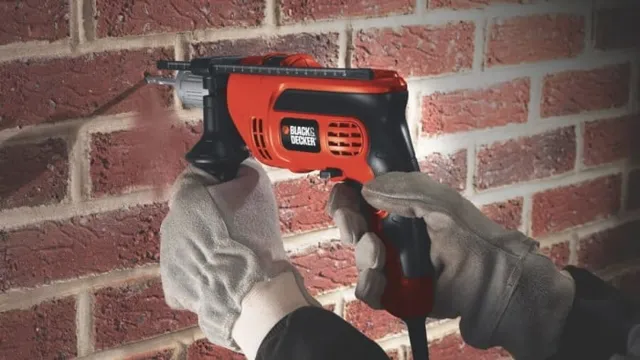Are Hammer Drills Worth It? Exploring the Benefits and Drawbacks

Are you someone who enjoys taking on DIY projects around the house or at work? Whether you’re a seasoned professional or a novice, having the right tools at your disposal can make all the difference. One of the most popular tools in any DIY enthusiast’s arsenal is the hammer drill. But with so many different options available, you may be wondering if it’s worth investing in one.
Will a hammer drill truly make your life easier and your projects more efficient? The answer is a resounding yes – but let’s delve into the details to explore why.
Understanding Hammer Drills
Are hammer drills worth it? If you are someone who regularly deals with tough surfaces like concrete, masonry, or metal, then having a hammer drill is a smart investment. These power tools are designed to offer a unique hammering action that helps you drill through hard surfaces that normal drills can’t penetrate. The hammer action means that you get additional force behind your drill bit, which makes it easier and faster to break through dense materials.
While they may be more expensive than regular drills, the time and energy you save quickly make up for the added cost. Additionally, many hammer drills offer several speed settings that allow you to customize your experience to better suit specific surfaces. This versatility, as well as their powerful construction, makes them an excellent option for DIY enthusiasts and professionals alike.
Overall, if you require a reliable tool for more significant projects, then a hammer drill is undoubtedly worth investing in.
What is a Hammer Drill?
A hammer drill is a power tool designed for drilling into hard materials like masonry, concrete, or brick. It uses a pulsating force that helps to break up materials and makes drilling easier and faster. Unlike regular drill drivers, a hammer drill has a special mechanism that creates the hammering effect.
Using a hammer drill can save time and effort when working on tough surfaces. They come in different sizes and shapes, and some models have features like variable speed control, depth stop, and reverse function. Hammer drills are a must-have for anyone working in construction, renovation, or home improvement.
They can make drilling into hard surfaces a breeze, but it’s important to use the right type of drill bit and wear protective gear when using one to ensure safety. Don’t hesitate to invest in a hammer drill if you find yourself working on hard surfaces often. The small upfront cost can save you a lot of time and energy in the long run.

How Do Hammer Drills Work?
Hammer Drills When it comes to drilling through tough materials like concrete, brick, or stone, a standard drill just won’t cut it. That’s where a hammer drill comes in. But how does it work? Essentially, a hammer drill combines rotary motion with percussive force to create a drilling action that is much more effective than a regular drill.
Inside the hammer drill, there is a mechanism that delivers a series of rapid hammer blows to the drill bit as it rotates. This creates a chiseling effect that helps to break up the material being drilled into smaller pieces, making it easier to drill through. With their unique design, hammer drills are an essential tool for anyone looking to work with tough materials, making drilling a faster and more efficient process.
Benefits of Hammer Drills
If you’re wondering whether hammer drills are worth the money, I can assure you they are definitely worth it. The benefits of owning a hammer drill are immense. Hammer drills are specifically designed for drilling into materials like concrete, bricks, and stones, which makes them ideal for construction purposes.
With a hammer drill, you can take on any drilling task with ease and speed, regardless of the material. So if you’re looking to make holes in tough materials, a hammer drill is the way to go. Additionally, hammer drills come with a hammer feature that ensures the drill bit pounds into the material for maximum drilling efficacy.
This feature also prolongs the life of the drill bit since it is not exerted to the same pressure it would have if it were used with a standard drill. Therefore, investing in a hammer drill can save you time, effort and prevent you from having to replace drill bits so often. In conclusion, if you want to get the job done quickly and efficiently, investing in a hammer drill is definitely worth the cost.
Efficiency in Masonry
Efficiency in Masonry When it comes to masonry work, having the right tools for the job is crucial. One tool that stands out above the rest in terms of efficiency is the hammer drill. With its powerful hammering action and drill bit rotation, a hammer drill can effortlessly tackle tough materials like concrete and brick.
This makes it an indispensable tool for masons looking to increase their productivity and work more efficiently. The benefits of using a hammer drill don’t stop there, though. They can also help to reduce fatigue and strain on the user, allowing them to work for longer periods without experiencing discomfort.
Additionally, hammer drills can be used for a variety of tasks, from drilling holes to chiseling away at materials. Overall, a hammer drill is a fantastic investment for any mason looking to maximize their efficiency and output.
Versatility for DIY Projects
Hammer drills are an essential tool for any DIY enthusiast. They’re incredibly versatile and can handle a variety of materials, including concrete, wood, and metal. One of the main benefits of hammer drills is their ability to drill through tough materials with ease.
They use a powerful hammering motion to break through surfaces, making them perfect for heavier-duty projects. Hammer drills also allow for greater precision and speed, making them ideal for use in DIY projects where accuracy is crucial. Additionally, they come with a range of features such as variable speed control, depth control, and cordless options, making them a very useful tool for both beginners and experts alike.
Whether you’re building a gazebo, installing shelves or mounting a TV, a hammer drill is an essential tool to have in your arsenal. So, why not invest in one today and take your DIY projects to the next level!
Reduced User Fatigue
Hammer drills are essential tools in the construction industry due to the numerous benefits they provide. One of the most significant advantages of using a hammer drill is reduced user fatigue. These drills are designed to deliver high-impact blows, which means that the user does not need to put in as much effort as they would with a conventional drill.
This reduced effort translates into less fatigue and strain on the user’s muscles, allowing them to work for longer periods without feeling tired. Another advantage of using a hammer drill is that it makes it easier to drill through tough materials, such as concrete and masonry. The high-impact blows help to pulverize the material, making it easier to drill through.
Overall, hammer drills are essential tools that can save time and energy, while also providing better results than traditional drills. So, whether you’re a professional contractor or a DIY enthusiast, a hammer drill is a must-have tool for your collection.
Disadvantages of Hammer Drills
If you’re considering purchasing a hammer drill, it’s important to also consider the potential disadvantages that come with it. While hammer drills are great for drilling into tough surfaces like concrete and brick, they can also be quite heavy and difficult to control. This can result in user fatigue or even the drill slipping out of your hand and causing injury.
Additionally, hammer drills tend to be louder than regular drills, which can be a nuisance if you’re using it for extended periods of time or in shared living spaces. Lastly, hammer drills are typically more expensive than regular drills, so it’s important to consider whether the added cost is worth it for your specific needs. Ultimately, while hammer drills can be incredibly useful for certain tasks, it’s important to weigh the pros and cons before making a purchase.
Expensive Compared to Regular Drills
One major disadvantage of hammer drills is that they can be quite expensive compared to regular drills. Due to the extra power needed to operate the hammering mechanism, these drills often come with a higher price tag. However, it’s important to consider your intended use before deciding on a drill.
If you only need a drill for occasional projects, a regular drill may suffice. But if you’re planning to tackle tougher materials like concrete or masonry, a hammer drill may be worth the investment. While it may cost more upfront, it can save you time and money in the long run by providing the necessary power and efficiency for larger projects.
Ultimately, it’s important to weigh the cost against the intended use and consider how much value the hammer drill can provide.
Limited Use on Hard Surfaces
Hammer Drill, Hard Surfaces While hammer drills are incredibly useful tools when it comes to making holes in concrete or bricks, they do have some disadvantages. One of these disadvantages is their limited use on hard surfaces. Despite their name, hammer drills may not be the ideal tool for drilling into really hard surfaces such as steel or thick concrete.
This is because the hammering motion can break the drill bit or put too much stress on the tool itself. When using a hammer drill, it is important to make sure that the surface you are drilling is not too hard and that you are using the correct drill bit, to avoid any damage or stress on the tool. While hammer drills are an excellent choice for certain jobs, it is important to understand their limitations and use them accordingly to maximize their effectiveness.
Conclusion: Are Hammer Drills Worth It?
At the end of the day, the answer to the question of whether hammer drills are worth it really depends on your individual needs and uses. If you’re a DIY enthusiast or professional contractor who frequently works with tough materials like concrete or masonry, then investing in a high-quality hammer drill will undoubtedly pay off in the long run. However, if you only use power tools occasionally for simpler tasks, you might be better off sticking with a standard drill and saving your money for other tools and supplies.
Just remember, sometimes it’s worth it to spend a little extra for a tool that will make your life easier and help you tackle more challenging projects with ease!”
FAQs
What are the advantages of using a hammer drill instead of a regular drill for DIY projects?
Hammer drills are designed to drill harder surfaces such as concrete or masonry, making them ideal for home renovation projects. They have a unique hammering function that makes them much more effective at drilling through hard materials than regular drills.
How much more expensive are hammer drills compared to regular drills?
The cost of hammer drills can vary widely depending on the brand and quality, but on average they are slightly more expensive than regular drills. However, the added cost is often worth it for those who regularly work with harder materials.
Can you use a hammer drill as a regular drill for softer materials like wood or metal?
Yes, most hammer drills come with a switch that allows you to turn off the hammering function, essentially turning it into a regular drill. This makes it a versatile tool that can be used for a variety of projects.
How long do hammer drills typically last?
The lifespan of a hammer drill will depend on several factors such as the brand and quality, as well as how often it is used. However, with proper care and maintenance, a good quality hammer drill can last several years.
Are there any safety precautions I should take when using a hammer drill?
Yes, it’s important to always wear safety glasses and a dust mask when using a hammer drill, especially when drilling into concrete or other hard materials that can create dust and debris. It’s also important to follow the manufacturer’s instructions and avoid applying too much pressure or force to the drill.
What features should I look for when buying a hammer drill?
When shopping for a hammer drill, look for one with variable speed control, which allows you to adjust the speed based on the material you’re drilling into. A comfortable grip and easy-to-use controls are also important features to consider.
Are hammer drills worth the investment for a casual DIYer?
It depends on the projects you plan to tackle. If you’re planning on doing a lot of home renovation projects that involve drilling into concrete or masonry, a hammer drill is definitely worth the investment. However, if you only plan on doing occasional DIY projects, a regular drill may suffice.







